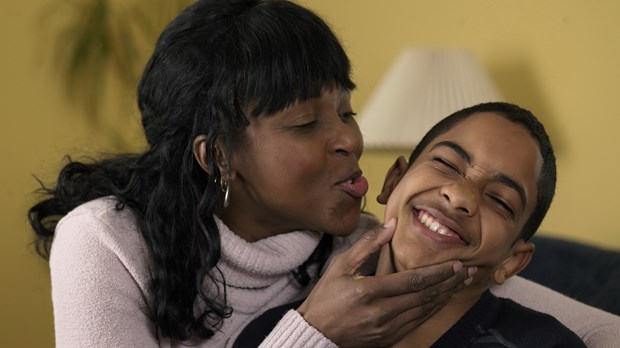Maintaining a Mother-Son Connection

Once I met a mother who bemoaned the fact that her 12-year-old son had changed. “He just won’t talk to me anymore. He used to tell me about everything, but now he’s clammed up and will hardly say anything. He doesn’t want to be with me.”
Her son’s behavior was pretty normal for his age, as I was reminded when I picked up my grandson Luke today after tennis camp and asked, “How was the camp today? Did you do drills or play actual games?” and all I got was “Okay.”
Boys Are like Oatmeal
I shared with this mother that children’s—and especially boys’—emotions and thoughts are a little like oatmeal. If you heat up a pot of oatmeal and it gets hotter and closer to a boil, bubbles come to the surface. In a similar way, as our sons get heated up through doing active things, their thoughts bubble up to the surface. They may even begin to talk. It helps you connect and know what’s going on with them, because with boys, action and activity lead to connectivity and bonding.
When I asked what her son enjoyed, she said golf. So she started driving the golf cart for him on afternoons when he played nine holes. She even went to the driving range with her son and took a few golf lessons so she could hit the ball.
Connecting definitely got more challenging when our oldest, Justin, hit adolescence and our son Chris hit his preteen years. They didn’t want to spend time doing “girl things” with me like shopping or sitting down at the kitchen table over tea to talk. It was easier for me to do things with our daughter Alison, like looking for earrings at the mall or talking over donuts and hot chocolate after school.
Connect Through Activity
I discovered the best way to connect with my sons was to get on their turf and see what they were interested in doing. Many afternoons after school, after Chris dropped his books on the kitchen table, I asked him, “Wanna shoot some hoops?” Or, depending on the season and weather, play Ping-Pong in the garage, ride bikes, or throw a football. When he was interested in playing golf, I drove the cart for him sometimes.
At this point, in our lives, I had a full-time job as a writer along with being a part-time teacher, but I’d drop what I was doing if Chris or Justin took me up on the offer. Out in the yard we’d go. After a while, they’d share a thought or tell about something that happened at school. Sometimes I’d hear about an exam coming up or a team tryout. But this was a no-strings-attached time together—not for asking a bunch of questions (which was natural for me) or expecting conversation, but just for hanging out.
With Justin, I played lots of tennis games since that was his main sport and my favorite one. One day in high school when his swing was really strong, he fired a serve over that hit me right in the eye, giving me a shiner. Ouch! Yet in those after-school and Saturday times with the boys, I learned to throw a pretty good spiral football pass and occasionally beat them in Ping-Pong. (My basketball-throwing skills remain pitiful. Chris often chuckled at my underhanded shots.)
Sometimes while we played, I heard Justin or Chris tell a story or talk about what was going on with them. Were we able to share that time every day? No, they were too busy, they had sports practice and homework, and I also had a daughter to get to ballet and piano lessons, dinner to fix, and all the regular stuff moms do. But those boys are now grown men in very time-intensive career and family years, and as I look back, those were some of the best times we had together. I cherish the memory of those moments.
Connect Through Shared Time
Shared time makes regular deposits in your boy’s emotional bank account. It might be an interest you both have in reading, music, hiking, bowling, running, or eating homemade cinnamon rolls together on a Saturday morning. Doing a crossword or Sudoko puzzle or going to a movie. Reading and praying together before lights out may be a good connection point when your son is elementary-school age, and for some boys, even when they’re older. You could teach your son something you know how to do. He might not be interested in learning to play the clarinet, but guitar or drums? It’s a possibility for connection.
Have dinner together as a family. Take flashlights for a night stroll with your son around the neighborhood. Get out in nature and you’ll both relax a little. “In a family, anything that is a ritual provides the possibility for emotional ‘safety’ because it is a familiar niche of time—a protected space—in which there is no pressure to perform, no pressure to measure up, and no threat of judgment,” according to Dan Kindlon and Michael Thompson. “If in that shared time together, a parent communicates openness, acceptance, and affection, then a boy learns these values of relationship.”
In William Pollack’s book Real Boys, he confirms the importance of just hanging out and sharing an activity with your son: “A boy’s natural language is usually action language,” so the time we spend doing simple, active, enjoyable things with our sons makes a difference.
Connect Through Music
We may be a generation apart, but music can connect our hearts. Elaine Shaw has found it enriching to learn from her boys, especially in the area of music. Her husband, Guy, was a musician, and music has always been an important part of their lives. Early on, their five boys heard classical music playing in the house and Mom took them to concerts and symphonies. In addition, they were exposed to hymns and beautiful church music. “All the while they were forging their own way,” Elaine told me. “They’ve got this whole universe of music that they’ve come up with.” Though she grew up in a strict Christian family and a narrow life, her sons developed a much more eclectic musical mix of their own.
To connect with her sons and appreciate what they were listening to, Elaine listened to artists she’d never heard of. Bryan was into rap in his adolescent years, so they’d sit and talk about it. In listening and discussing the music with her son, she realized something was being said here, so not to cast it off because the musicians looked different. Although they live in other places, sons Jake, Andrew, and Matthew make her CD mixes of favorite music and call it “A Little Music for Mama” for a Christmas or birthday gift. This is one of the ways she connects with her adult sons.
One of the real blessings for Elaine and her husband has been going to the little church where their oldest son, Trey, was pastor during his furlough year. Trey, his wife, Denise, and their children live in Budapest, Hungary, so it’s a thrill to hear him teach there on the rare occasion they get to visit. But during their year in Texas, Elaine played the piano for the small congregation each Sunday and took notes when her son taught God’s Word. Just as Elaine did, at different stages of life, when we can see our sons do what they love, participate if invited, or listen to their passion, it helps our connection.
Connect, No Matter What
Sometimes in adolescence, a young man goes through what I call a “prickly” stage, meaning he is easily angered, offended, or upset—especially by his parents. Sometimes this behavior is just part of the normal pulling away from you in order to become his own person. But strive to keep connected regardless, and let him know you are always open to discuss things or hang out. He still needs to hear from you and know you care.
It’s easy to think when your son pushes you away that he doesn’t need you. Your feelings get hurt, so you may withdraw and disconnect. But connections need to continue throughout adolescence. Your son still loves you and still needs you. Commit to connect.
Adapted from What a Son Needs From His Mom (Bethany House, 2013). Used with permission.
Cheri Fuller is an award-winning author of 42 books, including Mother Daughter Duet and The One Year Women’s Friendship Devotional. Connect with her at CheriFuller.com.
Read more articles that highlight writing by Christian women at ChristianityToday.com/Women
 Read These Next
Read These Next

 Should I Skip Church for Kids’ Sports?5 principles for making the tough call
Should I Skip Church for Kids’ Sports?5 principles for making the tough call
 You Are Worth Fighting ForFor when you feel too fat, too frumpy, too stupid, or too poor
You Are Worth Fighting ForFor when you feel too fat, too frumpy, too stupid, or too poor








 Homepage
Homepage